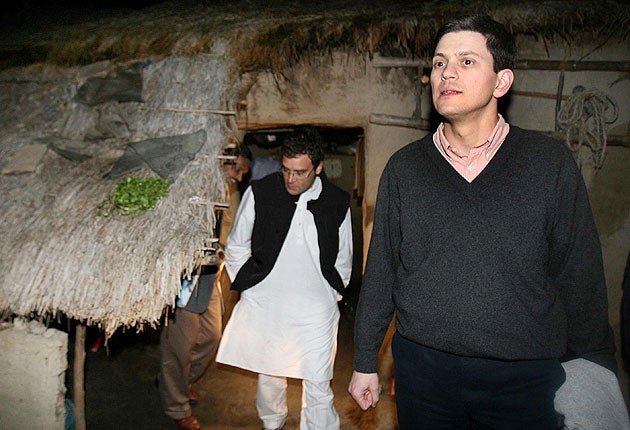Miliband infuriates India over Kashmir comments

Britain and India have become embroiled in a simmering diplomatic row over comments the Foreign Secretary David Miliband made about the disputed territory of Kashmir.
Writing last week in a British newspaper while on a visit to India, Mr Miliband said: "Although I understand the current difficulties, resolution of the dispute over Kashmir would help deny extremists in the region one of their main calls to arms, and allow Pakistani authorities to focus more effectively on tackling the threat on their western borders."
The comments were similar to those made last year by Barack Obama and some observers might think they constitute commonsense. But India is desperately sensitive over Kashmir, a formerly independent, Muslim-majority state whose Hindu princely ruler opted to join the new India rather than the new Pakistan following Partition. A referendum demanded by the UN has never properly been held.
Anxious not to give encouragement to other separatist movements within its borders, Delhi has ruled Kashmir with an iron rod, establishing one of the most heavily militarised regions in the world. Twice it has fought wars with Pakistan over Kashmir. It is also adamant in rejecting the unsolicited opinions of outsiders, and off-the-record briefings to Indian journalists by officials have described Mr Miliband as "arrogant". Other briefings have suggested Mr Miliband and Britain have been "too easy" on Pakistan in the aftermath of the Mumbai attacks.
Yesterday, the Indian Foreign Minister, Pranab Mukherjee, rejected any suggestion made by Mr Miliband that security in South Asia was linked to the Kashmir dispute. He said: "When the Foreign Secretary of the UK visited us he shared his perceptions about the situations, and I equally told him and all the interlocutors that this is your perception … We do not share it."
Perhaps Mr Miliband ought to have known better. A decade ago, one of his predecessors, Robin Cook, found himself in similarly hot water when he suggested Britain was ready to help Pakistan and India "help in the achievement of a negotiated and peaceful settlement of the Jammu and Kashmir dispute". At the time, officials in Delhi accused the British government of favouritism towards Pakistan. The present diplomatic row has no signs of slowing yet. Officials in the office of Indian Prime Minister Manmohan Singh were forced to dismiss reports that he had written to Gordon Brown, voicing his displeasure over Mr Miliband’s comments.
The shadow Foreign Secretary, William Hague, issued a statement questioning Mr Miliband’s conduct. "Good relations with India are very important to Britain and must be |handled with care and consistency," he said. "If David Miliband’s comments caused a diplomatic storm in Delhi, those relations will have been damaged by his visit."
The issue of Kashmir has been pushed into the spotlight after the Mumbai attacks, blamed by India on the Pakistan-based militant group Lashkar-e-Toiba (LeT) that had previously been active in the disputed region. Scores of LeT members have been arrested but India is demanding that Pakistan take them before the courts. It insists that evidence it has passed to Islamabad provides sufficient proof of the men’s guilt.
Join our commenting forum
Join thought-provoking conversations, follow other Independent readers and see their replies
Comments
Bookmark popover
Removed from bookmarks